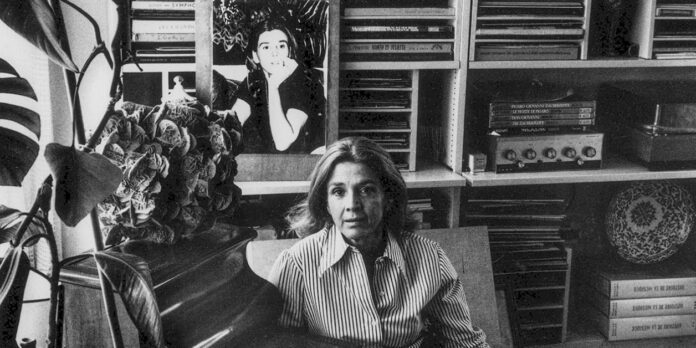“Would you have preferred to remain Tunisian if you had had the free choice? we asked him. – probably, responds Gisèle Halimi after a few seconds of reflection. Because I participated a lot in the struggle in this country, even if it was relatively short. It was rather in the battle of Algeria that I played the greatest role. Today, ask me if, after all, I am not more Algerian than Tunisian, given that I dedicated almost eight years of my life to the cause of Algerian independence. »
icon of French feminism
This is how Gisèle Halimi is defined, challenged by a guest during the television program today ma'am, in 1974. These observations are reported by Ilana Navaro in Gisèle Halimi, the troublemaker. The documentary filmmaker explains why she dedicated her first book to the woman who was a lawyer, activist and member of parliament during the first seven years of French President François Mitterrand's term: “When the icon of French feminism died in July 2020, I was surprised seeing how little people talked about their Tunisian origins. »
Three books evoking her “forgotten otherness” were released within a few months: in addition to Ilana Navaro's aforementioned essay, revolt in the heart, a youth romance, by Maia Brami, and Gisèle Halimi, a young Tunisiana graphic novel by Danièle Masse and Sylvain Dorange.
Zeïza Taïeb, daughter of La Goulette
Tunisia, Zeïza Gisèle Élise Taïeb was born there in 1927, in La Goulette. Her parents, ashamed of having a daughter, hide the child from those around her. His father, Édouard, is a Twensa [nom des Berbères judaïsés depuis l'Antiquité] and his mother, Fritna, a Grana [minorité juive d'origine italienne]. Proud of her lineage and full of pride, the latter believes she made a bad marriage.
During her childhood, Zeïza lived in between a mother who doesn't show the slightest sign of affection and a father who is admired to the point where his two daughters fight for the honor of wearing his shoes when he comes home from work. Of her mother, she will say: “Fritna is the explanation of my entire approach. I wish women didn't look like him. »
To situate the climate that prevails among the taïebs, Ilana Navaro cites, in her book, an anecdote told by Jean-Yves Halimi, one of Gisèle's sons: “One day, I told my grandfather what expressed those expressions in Arabic, that He often explained to me, and it was far from friendly: “I would like you to have your eyes gouged out by a butcher's tusk and go wait on the ceiling.” […] It is a family in which there was a very, very, very high level of noise.

Gisèle Halimi (left) with Djamila Boupacha, a young Algerian separatist for whom she was a lawyer. Here, April 22, 1962. © AFP
Two events mark Gisèle's early childhood. She was 6 or 7 years old when her younger brother, André, placed under her supervision, climbed over a pot that was on the fire. He will die after a few days in excruciating pain and no one will have the right to talk about him. Years later, she complains about having to take on household chores while her older brother, Marcelo, is away. She began a three-day hunger strike until she won her case and thus won her first fight for equality between men and women.
Their fight for equality continues in another form. At 11 years old, young Gisèle witnesses a scene during a demonstration for independence in Tunis. Police opened fire to disperse the crowd. Two days later, one of her colleagues will hilariously tell how French soldiers forced an Arabic teacher to take off his pants. Fueled by the books, which she devours, and by the French republican ideal, which defends freedom, equality and fraternity, the young woman rebels against the treatment reserved for Arabs. Much to her parents' chagrin, she took sides for Tunisian independence. Jacques, her paternal uncle, a communist, exerts a tolerant influence on her, and one day when, still a high school student, she auctions a newspaper near the Tunisian PC, her father surprises her and gives her a serious slap.
Meeting with General Massu
The young man's dream of going to France to study at the Sorbonne constitutes the milestone of revolt in the heartit's from Gisèle Halimi, a young Tunisian. The two books end with the same episode: at the airport, Gisèle, 18 years old, is about to board a flight to Paris in 1945. She goes in search of Marcelo, deported during the Second World War. An official version, which Ilana Navaro contradicts: in fact, Gisèle married a certain Raymond Zemmour, ten years older than her, when she was less than 20 years old. A marriage arranged and then hidden so as not to overshadow its feminist message.
With the diplomas in hand and the divorce decreed, the lawyer registered with the Tunis Bar Association and married civil servant Paul Halimi. Very quickly, she defended the Tunisian separatists. After a riot in Moknine, which the gendarmes mercilessly repressed, in 1953, she was the only woman who defended the defendants, some of whom were subject to the death penalty. For five years he followed this struggle and, after independence in 1956, he naturally returned to the courts of the neighboring country, Algeria.

“Gisèle Halimi, the troublemaker”, by Ilana Navaro (ed. of Equateurs, essay, 152 p., 17 euros); “The revolt in the heart”, by Maïa Brami (ed. Albin Michel Jeunesse, young adult novel, 307 p., 15.90 euros); “Gisèle Halimi, a young Tunisian”, by Danièle Masse and Sylvain Dorange (ed. Delcourt-Encrages, BD, 136 p., 17.95 euros). © JA Edition; Delcourt Editions; Albin Michel Editions; Ecuador Editions
That's it without Without a doubt, this episode in her life is why Gisèle Halimi has not (yet) entered the Pantheon. She lives between Paris, where her law office is located, and Algiers, where she defends her clients. His two sons, in Paris, benefited from the protection of UNEF students at a time when, as Benjamin Stora said, quoted by Ilana Navaro, “all those who wanted to oppose the French presence in Algeria in the form of possible independence or enemies.” Gisèle Halimi recounts, perplexed, a surreal interview she will have with General Massu. He justifies the use of torture by showing him the marks left by the electrodes they placed on his body to test his own resistance to pain. The distance between his French ideal and the reality of politics in Algeria only increases.
“The FLN prostitute”
In 1955, in the El Halia mining operation, Algerian nationalists killed 123 Europeans – miners and their families. The massacre is followed by blind and disproportionate repression. Until blindness during the trial in 1958: the defendants were accused based on confessions extracted under torture and without tangible evidence. Gisèle Halimi receives mini coffins at her home in Paris, which she transforms into garages for her children's mini cars! In May 1958, she participated in a demonstration that turned into a riot and was almost lynched by the crowd, who called her “FLN whore”. When the Public Safety Committee took power in Algiers, she was arrested with her colleague, Pierre Braun, and was only released a few weeks later. Her life constantly hanging by a thread, she believes in her baraka.
If one court case is particularly associated with the name of Gisèle Halimi, it is that of Djamila Boupacha. In 1960, this young 22-year-old FLN activist was detained in Barberousse prison because he wanted to detonate a bomb. Seeing that the place where she was supposed to leave it was crowded, she gave up. This inversion does not prevent her from being tortured and raped. Rape, frequently used by the French army, is often silenced by victims because it affects a taboo: the loss of virginity, experienced as even worse than torture.
With Simone de Beauvoir
In parallel with the legal action, Gisèle Halimi turned to her model, the philosopher and writer Simone de Beauvoir, who immediately wrote an opinion article in the world. Later, the two women will sign a book titled Djamila Boupacha, with a drawing by Pablo Picasso on the cover. The Djamila Boupacha Committee includes other personalities such as Jean-Paul Sartre, Louis Aragon, Geneviève de Gaulle, Germaine Tillion... The trial takes a political turn, and Gisèle Halimi uses it as a platform to accuse the government and the army of using torture and rape as war weapons. Djamila Boupacha was finally released in April 1962. From then on, the mujahideen (“fighter”) will get married and have children.
When she was around 12 years old, the future Gisèle Halimi, quoted by Maïa Brami, wrote: “In any case, I will be the lawyer against injustice. Lawyer with “e”. Way ahead of her time for the gender agreement, the feminist activist got it wrong about the number agreement: she was a lawyer against O injustices, whether colonial, committed against women, etc., as she will prove throughout her life.

